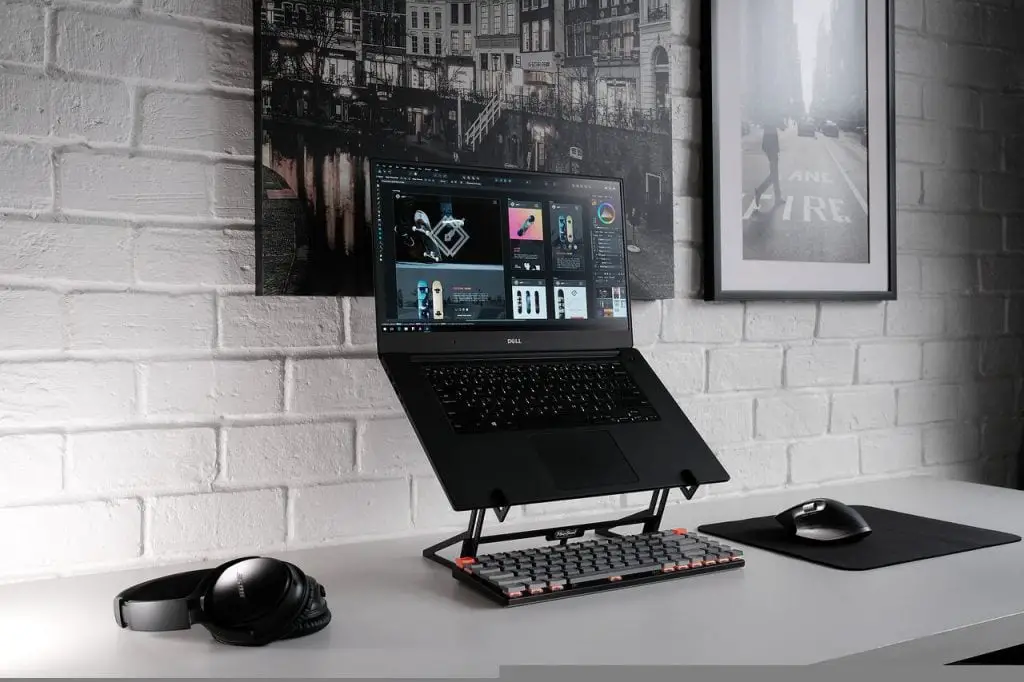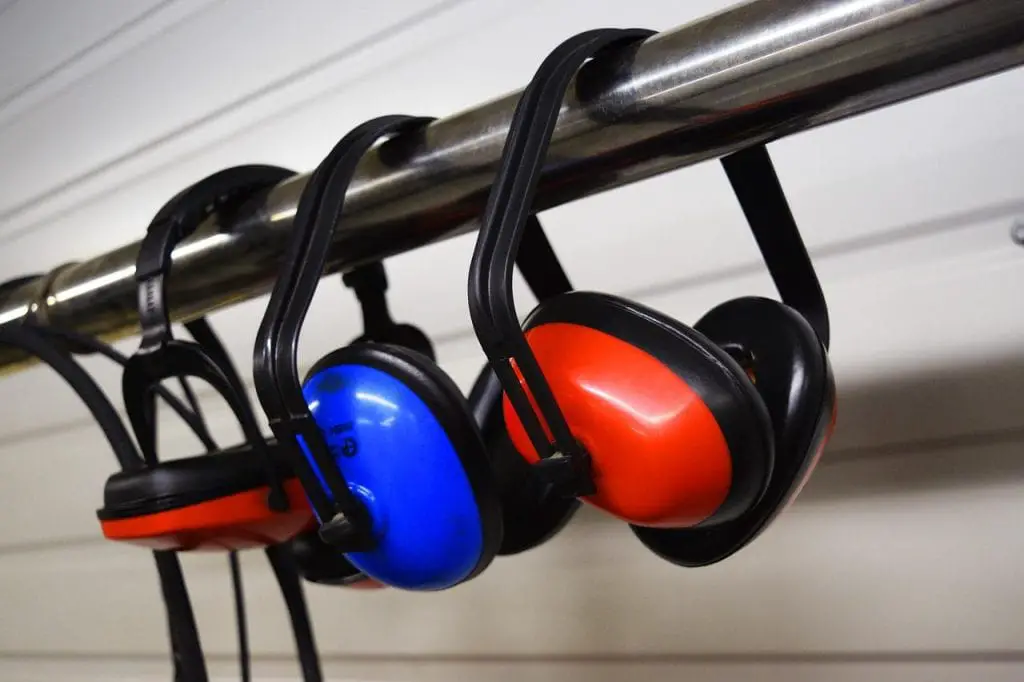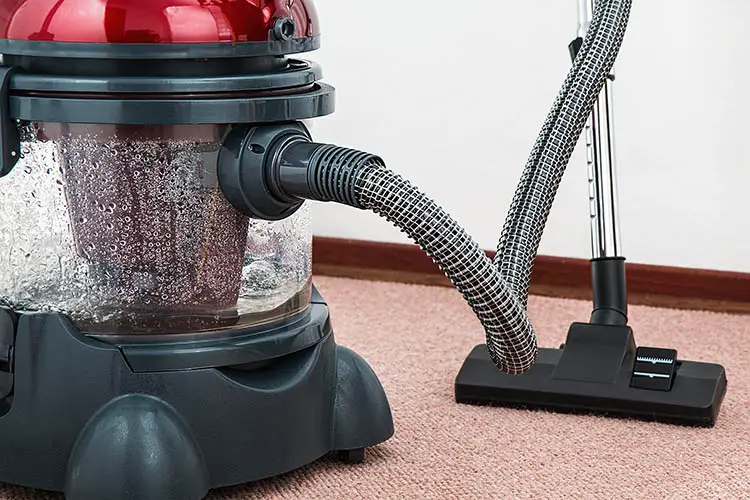Your baby is still learning about the world around them and sometimes that world can be a very scary place. Objects that make a lot of noise such as a vacuum may cause fear in your little one. So why are babies and toddlers afraid of vacuum cleaners? And is it normal? This is a very common fear in children. Even I was afraid of the vacuum when I was a child so I know exactly how frightening it can be.
According to Dr. Ari Brown, a leading pediatrician, babies have a very immature nervous system, which means that they can’t handle certain sensory input. Loud noises from a vacuum cleaner may cause them fear because it’s overwhelming for their nervous system.
- What is the Fear of Vacuum Cleaners Called?
- Why are Babies Afraid of Vacuum Cleaners?
- Methods to Vacuum When Baby is Afraid of the Vacuum Cleaner
- 1. Put noise-canceling headphones onto your baby’s ears
- 2. Put safety earmuffs on your baby’s head
- 3. Talk to them about the vacuum and its noise
- 4. Let your partner do the vacuum job
- 5. Clean with your baby’s help
- 6. Give names to the parts of the vacuum cleaner
- 7. Rely on your dog who will protect your baby
- 8. Hold them while you vacuum
- 9. Check for underlying issues
- Why can a Vacuum Cleaner Calm Some Babies?
- Conclusion
What is the Fear of Vacuum Cleaners Called?
The fear of vacuum cleaners is a common condition in children and it’s known as Zuigerphobia. It can become quite difficult for parents when their child has this fear. Not only are they scared of the vacuum cleaner being turned on but they also may have a fear of it appearing.
This is because even if they can’t see it, they know it could be hiding around any corner. They could even start to notice where the vacuum cleaner “lives” and become fearful of that particular place.
Why are Babies Afraid of Vacuum Cleaners?
Fear comes in many shapes and sizes when you’re a kid. The vacuum cleaner can be high on your child’s list of things to fear because of how loud it is. Dr. Ari Brown also suggests that as your child’s nervous system matures they begin to take notice of their surroundings and they may develop new fears. Babies have a fear of loud noises because their nervous system isn’t fully developed yet.
Methods to Vacuum When Baby is Afraid of the Vacuum Cleaner
1. Put noise-canceling headphones onto your baby’s ears

In some cases no matter how many times you try to explain that the vacuum cleaner isn’t scary, your child may still be afraid. If you can’t remove the child from the house, then you may want to try noise-canceling headphones. This will help block out the loud sounds and should help the child to remain calm.
I have Bose headphones which you can see in the image above. Its quality is superb so you can play some relaxing music to your baby so that she wouldn’t hear the vacuum (nearly at all).
If the baby is very young or quite spirited, they may not want to keep the headphones on their heads. If they keep removing them you may need to find a different solution.
2. Put safety earmuffs on your baby’s head

Using safety earmuffs may also help your baby. Earmuffs are a great way to protect your baby’s hearing and block out the loud noise of the vacuum cleaner. Babies and toddlers may react better to earmuffs because they can be softer than noise-canceling headphones.
3. Talk to them about the vacuum and its noise
This method might not work on very tiny babies, but you could try explaining to them what the vacuum is and what it does. Use a calm, reassuring tone and let them know that they shouldn’t be afraid. Show them that you’re in control and can turn the vacuum off any time you want to.
4. Let your partner do the vacuum job
Sit a comfortable distance away on the floor with your baby. Let your partner start to vacuum from across the room and move slowly towards you and your baby. You can make a game out of it. Make sure you’re sitting on a soft rug, such as one of these best rugs for babies to crawl on.
5. Clean with your baby’s help
Get your baby involved in the cleaning process. Let them pick up toys or give them age-appropriate tasks that can help make your job easier. Some companies even sell cute children’s vacuum cleaners that actually work (and which are noiseless).
6. Give names to the parts of the vacuum cleaner
If you have a vacuum that comes apart easily or has special attachments try giving each part cute, comforting names. For example baby hoover, or Mr clean. Let them play with the individual pieces and show them how the pieces fit together. Use the pieces in a make-believe game and pretend to clean with them. Soon your little one should want to join in.
7. Rely on your dog who will protect your baby
Chances are that your family dog is also not the biggest fan of the vacuum cleaner. Use this to your advantage. Turn on the vacuum and allow your dog to start barking at the vacuum cleaner.
Animal instinct will cause your dog to protect your baby. Once the dog has barked and growled a bit, act as if the dog defeated the vacuum cleaner. Praise your pet and give them a treat.
This process must be repeated until the child realizes that the dog will always win and that there is nothing to fear when the dog is around.
Take a look at this cute video of a baby running towards a dog for protection from the vacuum.
8. Hold them while you vacuum
Mommy and Daddy can protect them from anything, so why should they be afraid? Scooping them up into your arms before turning on the vicious machine could help abate their fears. If they are still small enough, wear them in a Baby K’tan Active or Breeze carrier while you vacuum.
9. Check for underlying issues
If your child is extremely afraid and covers their ears when they are exposed to loud noises they may suffer from hyperacusis. This condition causes the child’s ears to burn and become extremely painful when exposed to loud noises. In this case, it’s best to seek advice from your doctor.
Why can a Vacuum Cleaner Calm Some Babies?
Some babies, on the other hand, love the sound of the vacuum cleaner. It calms them and can even help them fall asleep. Experts suggest that the sound is reminiscent of the sounds inside the womb.
The sound of the vacuum drowns out all the other noises. This gives their ears nothing substantial to focus on, removing any other stimulation.
Conclusion
There is no need to worry if your child is afraid of the vacuum cleaner. Most children have had this fear in their lives, and outgrow it without any other issues. After reading this article, which suggestions will you try? I’m curious, so let me know as a comment or reach out to me via email.
Another fear that can come up is when your child is suddenly scared of her toy, an article I wrote about.
